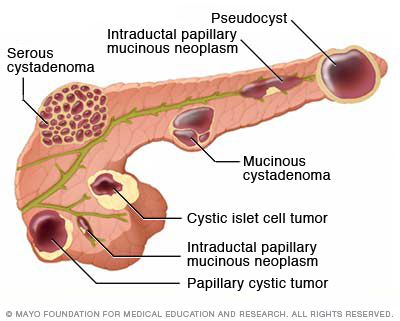Serous cystadenoma of pancreas is a benign tumor of pancreas. This cystic neoplasm is made up of several small cysts spread into a honeycomb like appearance. Serous cystadenoma of pancreas is mainly present in women, especially over the age of 60 years. The size of tumor is usually small. This type of cystic neoplasm of pancreas does not produce any signs and symptoms in majority of cases.
If symptoms occur, they are abdominal pain, loss of appetite, and indigestion.
In many patients this tumor is an incidental finding. It is detected accidentally when the patient undergoes radiological tests for some other medical condition. The neoplasm generally is located in body or tail of pancreas. Pancreatic gland is divided into head, body and tail.
Serous cystadenoma of pancreas is a benign tumor.
It does not transform into malignant cancer. Usually no treatment is necessary, unless it gets enlarge in size. In such case the tumor may need surgical removal.

Causes Of Pancreatic Serous Cystadenoma
Pancreas is an important gland which produces digestive juices as well as insulin and glucagon hormone needed for maintaining optimum level of sugar in the blood. Pancreas is an abdominal organ. Serous cystadenoma of pancreas is an uncommon form of cystic tumor of pancreas.
The exact cause is yet not completely understood. It accounts for approximately 1% of all types of pancreatic tumor. Both males and females can be affected with this tumor; however, there is a strong predilection for females. It usually occurs in people over the age of 60 years.
The particular risk factors for development of serous cystadenoma of pancreas is not known, but common risk factors that attribute development of any pancreatic tumor are also suspected to be the cause. This includes elderly age, cigarette smoking, alcoholism, obesity, poorly controlled diabetes, chronic pancreatitis, exposure to environmental pollutants, and cirrhosis of liver.
Signs And Symptoms Of Serous Cystadenoma Of Pancreas
The signs and symptoms of serous cystadenoma of pancreas depend on its size. Almost one third of patients suffering from this condition do not reveal any symptoms. In majority of cases the size is very small typically less than 10mm. It is a solitary tumor with network of several tiny cysts that gives a morphological appearance of honeycomb. The serous cyst is present in either tail or body of pancreas.
If the serous cystadenoma of pancreas enlarges in its size, it can give rise to following symptoms;
- Unwarranted loss of weight.
- Pain in middle of back, exactly just below the space between two scapula.
- Pain in abdomen
- Loss of appetite
- Indigestion
- Nausea and vomiting
- A large tumor can cause obstruction in flow of bile and enzymatic juices. This may result in jaundice or yellow discoloration of eyes, skin and nail.
- When jaundice is present the color of urine becomes dark yellow.
- There may be black tarry stool. In medical terminology it is referred as malena.
Serous cystadenoma of pancreas is well demarcated tumor. It mostly occurs as a single entity. Its size may be less than 10mm. But the tumor has potential to enlarge in size.
Serous Cystadenoma Of Pancreas Complications
Normally there are no complications associated with serous cystadenoma of pancreas. However, when they occur it is because of its enlarged size. Complications may not be life threatening but often cause extreme discomfort to the patient.
- A large tumor can cause obstruction in gastric and intestinal motility.
- It can cause obstruction in the pathway of biliary tract resulting in jaundice.
- A large tumor can cause interference with the organs located nearby pancreas. This may create problems in the functioning of the affected organ.
- If the pancreatic cells are destroyed in large numbers due to enlargement of serous cystadenoma, it may give rise to diabetes.
Treatment Of Serous Cystadenoma Of Pancreas
Pancreatic serous cystadenoma is typically small and benign tumor. A giant serous cystadenoma is a rare event. It is more found in females of elderly age. Most patients remain asymptomatic due to the small size and slow growth. Both these factors do not exert pressure on the adjacent organs and tissues. Hence majority of doctors recommend wait and watch approach to the patients. However, regular follow up is always necessary in such cases.
If there is a giant sized serous cystadenoma of pancreas which adheres or infiltrates the nearby tissues causing symptoms, it may need to be removed through complete surgical excision of the growth. Even after surgical removal of the tumor, patient needs regular check up with the doctor. The prognosis of this condition is good with treatment.

Post a comment